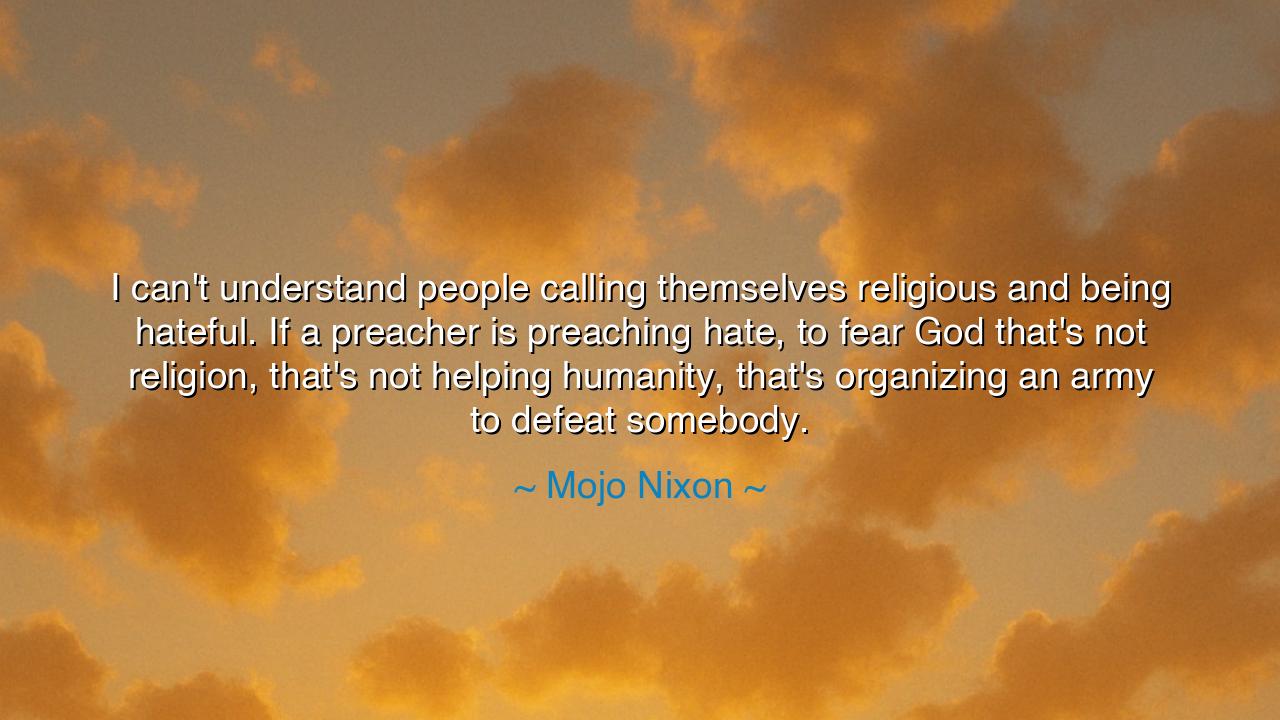
I can't understand people calling themselves religious and being
I can't understand people calling themselves religious and being hateful. If a preacher is preaching hate, to fear God that's not religion, that's not helping humanity, that's organizing an army to defeat somebody.






“I can’t understand people calling themselves religious and being hateful. If a preacher is preaching hate, to fear God—that’s not religion, that’s not helping humanity, that’s organizing an army to defeat somebody.” — so spoke Mojo Nixon, the firebrand musician and truth-teller, whose words pierce the veil of hypocrisy that too often shrouds the sacred. Though simple in tone, this declaration carries the weight of an ancient moral truth: that true religion is love, and that any creed which breeds hatred has lost its soul. Nixon’s cry is not one of rebellion against faith, but of defense for its truest essence. He speaks, as the prophets once did, against those who twist holiness into a weapon, and who turn fear into their god instead of compassion.
The origin of this quote lies in Nixon’s lifelong stance as a provocateur and critic of false piety. A man who walked outside the boundaries of polite society, he saw clearly what many within its walls could not: that too often, those who claim the mantle of religion use it not to uplift but to divide, not to heal but to harm. He saw the contradiction in the human heart — that people who speak of love can also sow hatred, and that those who preach forgiveness can nurture cruelty. In his raw and unpolished voice, he names this for what it is: not religion, but an army in disguise — a movement of control, not of compassion; of domination, not of devotion.
Throughout history, this perversion of faith has repeated like a tragic refrain. The Crusades, fought under the banner of Christ, left rivers of blood where mercy should have flowed. The Inquisition claimed to defend the soul but crushed it instead. And in our own time, preachers have raised their pulpits to condemn rather than console, to sow division among the children of the same God. Yet, as Nixon reminds us, this is not religion — it is fear dressed in holy robes, a counterfeit faith that seeks enemies instead of understanding. It is the corruption of what was meant to be the highest human calling: to love one’s neighbor as oneself.
But even in this darkness, there have always been those who embody the true spirit of religion — those who see faith not as a fortress, but as a bridge. Consider Martin Luther King Jr., a preacher who stood at the crossroads of hate and love. Surrounded by violence, he chose peace; confronted with cruelty, he answered with compassion. He understood that to fear God was not to tremble before divine wrath, but to walk humbly in divine love. “Darkness cannot drive out darkness,” he said, “only light can do that.” King’s message was not merely Christian — it was universal, the echo of every faith at its purest core. Where others organized armies, he organized hearts. And that, Nixon would say, is religion at its truest.
Nixon’s words cut through centuries of confusion: religion, he says, is not a cause for conquest, but a discipline of love. To be religious is not to raise one’s voice in judgment, but to quiet one’s heart in empathy. If a preacher speaks only of enemies, he has lost sight of the divine; if faith teaches only fear, it has turned from heaven to earth. For the greatest act of faith is not obedience to dogma, but compassion in the face of difference. Religion, when alive and true, teaches us to serve, to forgive, and to see the sacred spark in all beings — not to destroy it.
And yet, the human heart is fragile. Pride masquerades as righteousness; anger as zeal. The line between devotion and domination is thin, and easily crossed when love is replaced by fear. This is why Nixon’s challenge endures: he calls us not to abandon religion, but to purify it. To strip away the noise of hate and rediscover its music of mercy. For faith without love is hollow, and worship without kindness is mockery. A fearful faith builds armies; a faithful heart builds peace.
So, my child, let this be your lesson: do not measure faith by the volume of its sermons, but by the warmth of its deeds. If you follow a creed, let it lead you not to scorn but to service. If you pray, let your prayers soften your heart, not harden it. If you speak of God, speak gently — for every soul you meet bears His reflection. Remember always that hatred in the name of religion is not devotion but defilement; it is not strength but sickness.
Walk, then, as one who builds bridges, not walls. Love, even when the world mocks you for it. And if you ever meet a preacher of fear, answer him not with fury, but with light. For as Mojo Nixon reminds us, the truest religion is not about defeating somebody — it is about defending humanity, and keeping alive the eternal flame of love that no hatred can extinguish.






AAdministratorAdministrator
Welcome, honored guests. Please leave a comment, we will respond soon